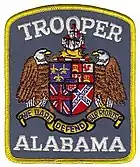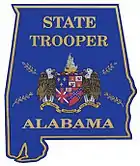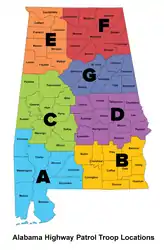Alabama Highway Patrol
The Alabama Highway Patrol is the de facto state police organization for the U.S. state of Alabama, and which has full jurisdiction anywhere in the State. The Alabama Highway Patrol was created in 1936. Since its establishment, 29 officers have died while on duty.[3] It is subordinate to the Alabama Department of Public Safety, which is itself subordinate to the Alabama Law Enforcement Agency.
| Alabama Highway Patrol | |
|---|---|
 | |
 Alabama Highway Patrol door seal | |
| Abbreviation | AHP |
| Motto | Courtesy, Service, Protection |
| Agency overview | |
| Formed | 1936 |
| Employees | 1,268 (as of 2004) [1] |
| Jurisdictional structure | |
| Operations jurisdiction | Alabama, US |
 | |
| Map of Alabama Highway Patrol's jurisdiction. | |
| Size | 52,419 square miles (135,760 km2) |
| Population | 4,627,851 (2007 est.)[2] |
| General nature | |
| Operational structure | |
| Headquarters | Montgomery, Alabama |
| Trooper / Special agents | ≈507 (as of 2020) |
| Civilian employees | 930 (as of 2015) [1] |
| Agency executive |
|
| Parent agency | Alabama Department of Public Safety |
| Facilities | |
| Posts and field offices | 17 posts and 3 field offices |
| Website | |
| Official AHP website | |
History
First pony car vehicles
In 1971 the Alabama Highway Patrol became the first police organization in the United States to use downsized vehicles for regular highway patrol duties. This pre-dated, among others, the Camaros and Mustangs that were used by other departments years later. AMC Javelins were the first pony cars used as police cars by any U.S. organization.[4]
The Alabama Highway Patrol evaluated two versions supplied by Reinhardt AMC of Montgomery, Alabama: a 1971 AMC Javelin SST with a 304 cu in (5.0 L) V8 and a 1971 Javelin-AMX with a 401 cu in (6.6 L) V8 engine.[5] Because they were so different than the traditional police cars, the Javelin AMX "was the most abused police car in the history of Alabama".[6] The "401-cu.in. V-8, three-speed automatic and 2.87 gears were good for about 140 mph, by which point the nose of the car started to get rather light".[7]
After this trial, the first order was for 61 cars finished in silver and ten unmarked cars in various colors.[8] Due to further cost-cutting reasons they were base model Javelins with heavy-duty "fleet" equipment, "machine wheels" with Goodyear Polyglas raised-white-lettered tires, and rear spoilers (normally available only on Javelin AMX models) to display the "state trooper" markings on the rear of each car.[5] A "401" emblem covered the holes in the spoiler to replace the AMX emblem. During 1972, a total of 62 Javelins were ordered: 12 in all silver paint, 42 were finished with the hoods, decklids, and spoilers in blue over silver body as the new police car scheme, as well as eight were unmarked cars in various colors.[8] The 1972 models were only available from AMC as "SST" versions and included additional exterior and interior trim. The 1972 versions were delivered by Reinhardt AMC and also by Bill Whitten AMC/Datsun in Birmingham.[8]
A total of 132 Javelins were purchased during 1971 and 1972.[9] The Javelins came with 401 cu in (6.6 L) 335 horsepower (250 kW; 340 PS) AMC V8 engines.[10] The cars had a 1st-gear lock-out feature installed by state maintenance[8] and were capable of going over 150 mph (240 km/h)."[11] The last of the AMC Javelins was retired in 1979, and one of the original cars is now part of the Museum at DPS Headquarters.[10][12]
James Fowler
Trooper James Bonard Fowler became a significant player in escalating the acute racial conflict that led to the Selma to Montgomery marches in the civil rights movement.[13] As a corporal in the Alabama State Police in 1965, he shot and killed an unarmed black man, Jimmie Lee Jackson, but was not prosecuted and convicted for the killing until 45 years later.[13][14] In a later incident, he shot and killed an unarmed black man by the name of Nathan Johnson. Johnson had been arrested for suspicion of drunken driving on U.S. Highway 31 and was fatally shot by Fowler at the Alabaster, Alabama Police Department.[15][16]
Weapons issued
The currently issued sidearm for Alabama state troopers is the Glock 22 .40 S&W. Additional weapons provided to troopers include the Bushmaster M4-type carbine rifle and the Benelli M4 police magnum shotgun. Less-than-lethal weapons include OC (pepper) spray, ASP collapsible batons, and tasers.
In 2019 the Alabama Highway Patrol began issuing the Glock Model 17 Gen 5 9 mm
Troops
The Alabama Highway Patrol's troops cover the following counties as listed:
Rank structure
The Alabama Department of Public Safety has a paramilitary rank structure and the rank structure is as listed:
| Rank | Insignia |
|---|---|
| Director (colonel) | |
| Assistant director (lieutenant colonel) | |
| Chief (major) | |
| Captain | |
| Lieutenant | |
| Sergeant | |
| Corporal | |
| Senior trooper | No rank insignia |
| Trooper | No rank insignia |
References
- USDOJ Statistics Archived November 20, 2008, at the Wayback Machine
- "2007 Population Estimates". Census.gov. 2009-01-07. Archived from the original on 2010-11-08. Retrieved 2010-11-18.
- "Alabama Department of Public Safety, Alabama Fallen Officers". Odmp.org. Retrieved 2015-09-01.
- Newhardt, David; Harholdt, Peter; Yates, Brock (2009). Art of the Muscle Car. MBI Publishing. p. 85. ISBN 978-0-7603-3591-8. Retrieved 1 May 2016.
Alabama State Police officials felt that if they couldn't beat 'em under the rules, then they would change the rules.
- "The 1971–1972 AMC Javelin – The Original Pony Police Car". Special Service & Non-Traditional Police/Fire Vehicles. Archived from the original on 3 March 2016. Retrieved 1 May 2016.
- Strohl, Daniel (December 2007). "Alabama Hammah – AMC Javelin". Hemmings Muscle Machines. Retrieved 1 May 2016.
- Strohl, Daniel (10 October 2007). "158 mph in the boss's car on an Alabama evening". Hemmings. Retrieved 1 May 2016.
- Rosa, John (28 May 2009). "The Alabama Department of Public Safety – AMC Javelin Highway Patrol/Pursuit cars". JavelinAMX.com. Retrieved 1 May 2016.
- Newhardt, pages 182-187.
- "The Alabama State Trooper – AMC Javelin". Alabama Department of Public Safety. 2012. Archived from the original on 26 October 2012. Retrieved 1 May 2016.
- Golfen, Bob (14 November 2014). "Pick of the Week: 1972 AMC Javelin police-car tribute". Classic Car News. Retrieved 1 May 2016.
- "Department of Public Safety History: 1935–1990". Alabama Law Enforcement Agency. Archived from the original on 13 April 2016. Retrieved 1 May 2016.
- Fleming, John (6 March 2005), "The Death of Jimmy Lee Jackson", Anniston Star, archived from the original on 24 November 2010, retrieved 2008-01-21
- Brown, Robbie (15 November 2010). "45 Years Later, an Apology and 6 Months". The New York Times. Archived from the original on September 13, 2014. Retrieved 16 November 2010.
- "FBI: Ex-Alabama trooper Fowler's 1966 killing of black man in Alabaster jail still probed". Anniston Star. Associated Press. 24 November 2009. Archived from the original on 6 December 2010. Retrieved 3 February 2011.
- "FBI says ex-trooper's 1966 killing of black probed". Anniston Star. Associated Press. 24 November 2009. Archived from the original on 6 December 2010. Retrieved 3 February 2011.